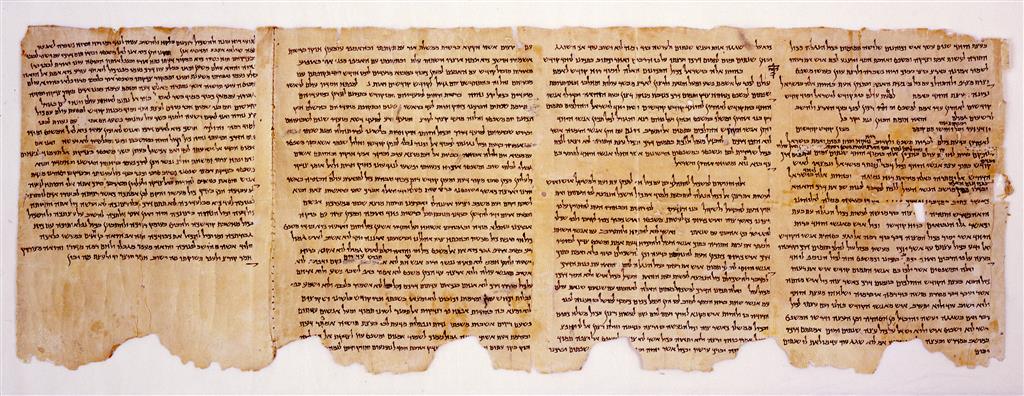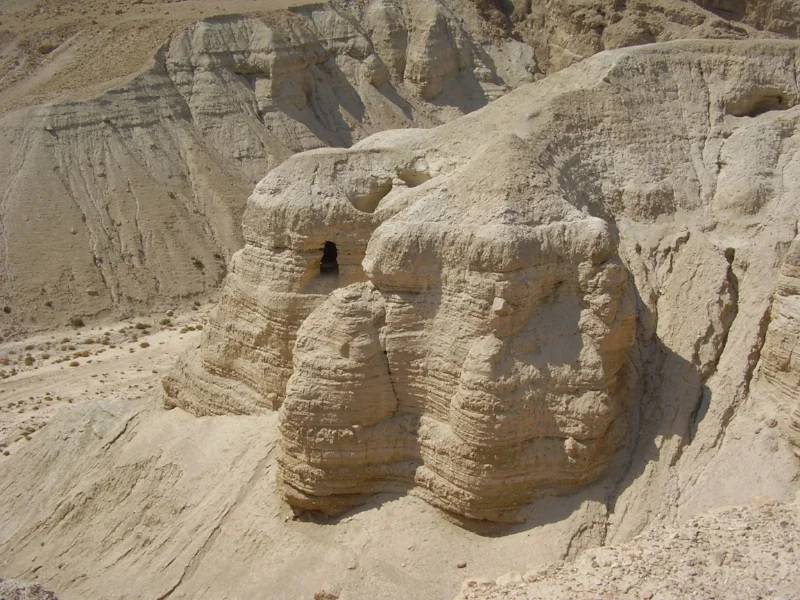Beth Berkowitz and Ishay Rosen-Zvi share a book that was an "unexpected influence" upon their academic work.
Read MoreWar, Violence, and Peace in the Dead Sea Scrolls
Why Do We Do This? : A Response to Recent Works on Epiphanius
"Is there something fundamentally flawed or unhelpful about that intellectual judgment? By turning attention toward these other factors, are our authors actually seeking to problematize the style of intellectual history that does intrinsically judge who is the deeper, the more imaginative, the more coherent thinker?"
Read MoreThe Growth of Texts at Qumran: A Forum
AJR and @TWUDSSI’s first forum celebrating the 70th anniversary of the discovery of the Qumran scrolls with pieces by Reinhard Kratz, Drew Longacre, Menachem Kister, Charlotte Hempel.
Read MoreThe Community Rule Manuscript Tradition from Qumran and the Growth of Ancient Jewish Texts
Dr. Charlotte Hempel on tracing the complex textual evolution of 1QS. Celebrating #DSSat70 with @twudssi.
Read MoreCombating Heresy: Attending to Violence in Epiphanius' Panarion
"These violent images of the punishment and execution of dehumanized and embodied cognitive errors are the signs of a religious movement marked by dissent and disorder. Epiphanius, therefore, gives us a shameless and corporeal fantasy of exactly what is not happening in 370s after Julian and under the policies of Valens: the defeat and mastery of all error, whether idolatry or heresy. The contemporary proliferation of spiritual violence called forth the shameless exorcist, who fused disputation with death. "
Read MoreThe Multiple Faces and Phases of Texts at Qumran: Growth, Expansion, and Rewriting in Community Documents
Two New Books on Epiphanius: Biography and Its Limits for Late Antiquity
"In effect, then, both biographies unsettle the very presumption that underpins the genre—that is, confidence in the possibility of recovering enough of the life and experiences of a person to recount as a narrative in writing. The inner life and experiences of Epiphanius here remain bracketed. What is written, instead, is the story of his performed and constructed persona, in the case of Kim, and his iconicity and celebrity, in the case of Jacobs."
Read MoreReflections on the Textual Development of the Pentateuch in Light of Documented Evidence
Dr. Drew Longacre on scribal intervention and innovation in the Pentateuch at Qumran. Celebrating #DSSat70 with @twudssi.
Read MoreOut of the Shadows: An introduction to Young Richard Kim's Epiphanius of Cyprus: Imagining an Orthodox World
"Young’s main instrument in this task is close and contextual readings of key scenes in Epiphanius's master-work, the heresiographic Panarion, as autobiographical moments that allowed Epiphanius to imagine an orthodox world and his own central place in it."
Read MoreInsights into the Growth of Biblical Literature from the Dead Sea Scrolls
Dr. Reinhard Kratz on Qumran and compositional growth of biblical texts. Celebrating #DSSat70 with @twudssi.
Read More“Epiphaniana”
"Andrew takes us from present theory to past subject and ultimately brings us back to the present, rendering us the subject, and challenges us, the reader, to ponder our assumptions about what Late Antiquity was and is and how the pieces of our extant puzzle fit into it."
Read MoreEpiphanius of Cyprus: Reconsidered
"In modern scholarship Epiphanius has thus been routinely maligned as hell-bent on sniffing out heresy wherever it could be found, fanatical, narrow-minded, intransigent, aggressive, theologically inept, and even given to buffoonery. But is there more to this figure than these caricatures suggest?"
Read MoreBook Note | The People Beside Paul: The Philippian Assembly and History from Below
"How does an orientation towards “a people’s history,” following Howard Zinn, help scholars ask new questions about the context and content of Paul’s Letter to the Philippians, a brief but important text in the Pauline corpus?"
Read MoreDissertation Spotlight | Philip Michael Forness
"Around seven hundred homilies authored in Syriac survive from the fourth through sixth centuries. Yet most have resisted efforts to identify their dates, locations, and liturgical settings. By attending to these texts, we are forced to confront the difficulty of interpreting the seemingly de-contextualized remains of most sermons from late antiquity."
Read MoreTeaching Students to Read (the Mishnah)
Dr. Sarit Kattan Gribetz shares her strategies for teaching the Mishnah to students with no exposure to rabbinic texts.
Read MoreLearning to Read Talmud: Bridging Scholarship and Pedagogy
"Much as we write about the Talmud itself, we pay far less attention to the significance and contribution of writing about our teaching. With our book, Learning to Read Talmud, we aim to expand the research agendas of Talmudists to include scholarship on the teaching of rabbinic literature."
Read MoreWhat's Divine About Divine Law? #SBLAAR16
SBL's History of Rabbinic Literature's 2016 review panel of Dr. Christine Hayes' What's Divine About Divine Law?
Read MoreChristine Hayes: A Response to the SBL Forum
Christine Hayes responds to the SBL forum featuring her book, What's Divine About Divine Law?
Read More
















![Paul Writing His Letters attributed to Valentin de Boulogne [Public domain], via Wikimedia Commons](https://images.squarespace-cdn.com/content/v1/5449167fe4b078c86b41f810/1482324718488-P5P72NL97X7AQLIVIG03/image-asset.jpeg)